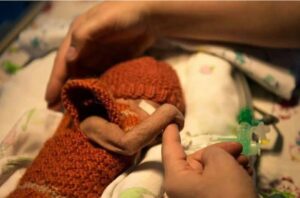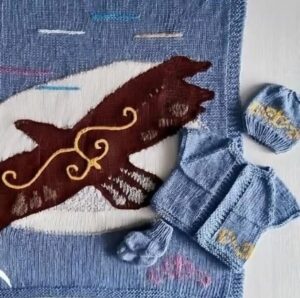ASTANA – For more than a decade, the 28 Loops Public Foundation has been supporting premature newborns in Kazakhstan by providing hand-knitted woolen clothing to help them retain warmth and conserve energy for survival. What started as a grassroots initiative has grown into an international movement, with volunteers in all major Kazakh cities and 13 countries united by a shared mission.

Karla Nur, a photographer, journalist and founder of the 28 Loops. Photo credit: Nur’s Instagram page
The project was founded in 2012 by Karla Nur, who stated that the initiative has expanded to 150 branches with over 6,000 active volunteers. To date, over 400,000 knitted items have been donated.
Karla said those interested in opening a local branch under the 28 Loops brand should adhere to certain rules. Volunteers are required to deliver knitted items quarterly, depending on regional birth rates, and must organize regular meetings. Selling donated items is strictly prohibited, and all products must be made from 100% wool. Additionally, every branch should share updates on Instagram or other social media platforms.
“We do not actively seek volunteers—word of mouth brings people to us. People hear about what we do and want to get involved. We help set up branches and provide remote training,” said Karla in an interview with The Astana Times.
“One reason for the project’s success is that it requires minimal resources, just knitting needles, wool, and regular meetings. Anyone can join, regardless of age. We even have men participating. You do not need to know how to knit—we teach, and with practice, it gets easier,” she added.
She acknowledged that she did not know how to knit when she started and learned the skill through the club. The most challenging task for her was knitting a sock—her first attempt, which she still keeps, turned out more like a triangle.
A simple idea with a profound impact
Each set includes a blanket, a vest, socks, a cap, and a special octopus-shaped toy. The toys serve a purpose beyond comfort—when a baby grasps the tentacles, they mimic the mother’s umbilical cord, helping to calm the newborn and prevent them from pulling out medical sensors.
To join the club, volunteers need to bring their yarn and knitting needles. The foundation is self-funded, with members covering material costs themselves.
“Some participants knit 20 sets at a time, which can be expensive. In those cases, we seek sponsors to help buy yarn. I would love to source yarn from Kazakhstan rather than ordering from Russia or Türkiye, but unfortunately, local production does not exist yet,” said Karla.
Changing lives beyond the babies
For parents of premature babies, the knitted sets provide both emotional and medical support. Over the years, Karla has received many touching stories about the club’s impact.

Premature babies have a thermoregulation disorder and there is a need to take care by retaining their heat from the first seconds.
“Many mothers express their gratitude. One mom shared how comforting it was to see her baby wrapped in our knitted items. Over time, she watched the cap go from covering her child’s nose to fitting perfectly, marking her baby’s growth. Two years later, she wrote again, saying she still remembers our kindness,” she said.
According to her, the club’s impact extends beyond helping premature babies—it also transforms the lives of its volunteers.
“Five years ago, a man wrote to me thanking us for starting the movement. He had lost his father, and his grieving mother struggled to find meaning. Joining the club gave her purpose, and she gradually came back to life. I always knew our work supported babies, doctors, and mothers, but I hadn’t realized how deeply it could impact volunteers as well,” she said.
Karla recalled another touching story about a volunteer, Violetta Nikolaevna. After suffering a stroke that left her right side paralyzed, she lost her ability to walk and speak. Determined to recover, she asked for knitting needles and a crochet hook as soon as she returned home. At first, she struggled, but over time, she improved. Nine months later, she attended a club meeting—walking in on her own.

Each woolen set includes a blanket, a west, socks, a cap, and a special octopus-shaped toy.
The foundation has inspired similar initiatives now operating in Kazakhstan, including Threads of Goodness, 40 Loops, and Early Rehabilitation of Newborns.
She noted that many people are aware of the initiative and are willing to support it as sponsors. She also highlighted that Kazakhstan has created favorable conditions for charitable foundations and volunteer initiatives, contributing to positive outcomes.
“I appreciate how volunteerism and charity are supported in Kazakhstan. The government is lenient with documentation and tax requirements. We do not generate revenue, we are not a financial institution, so the conditions here are very favorable. The best support we receive is visibility. When people talk and write about the foundation, it helps us reach more people and encourage participation,” said Karla.
